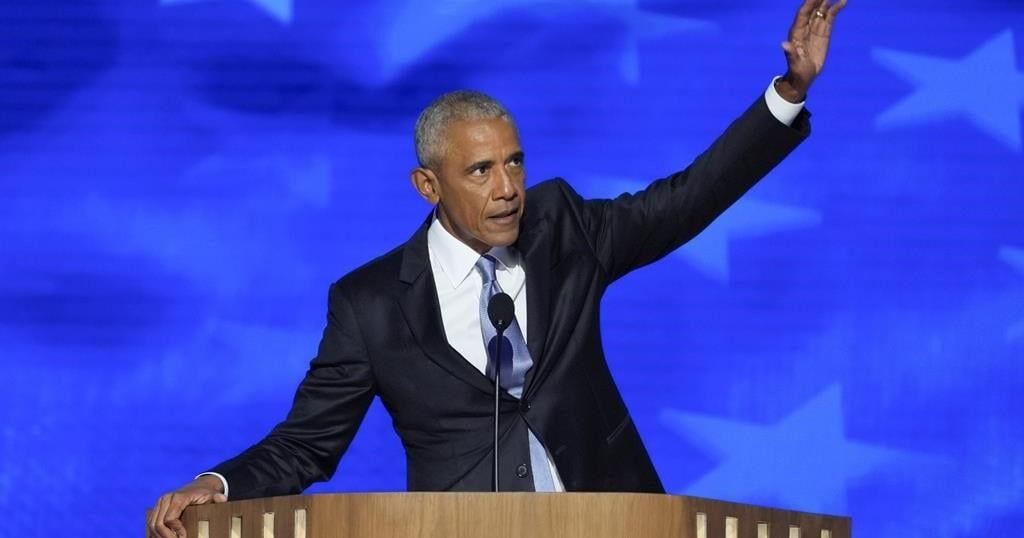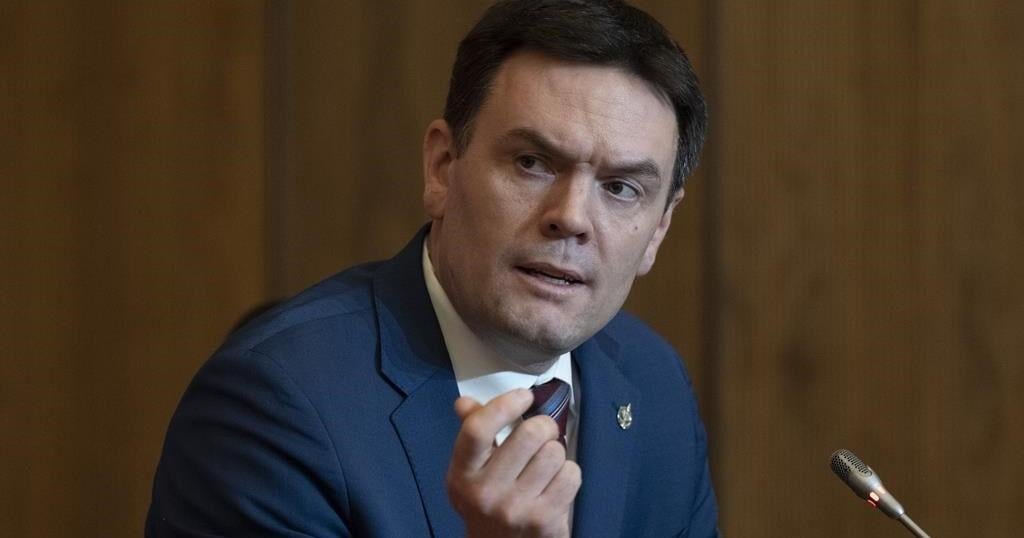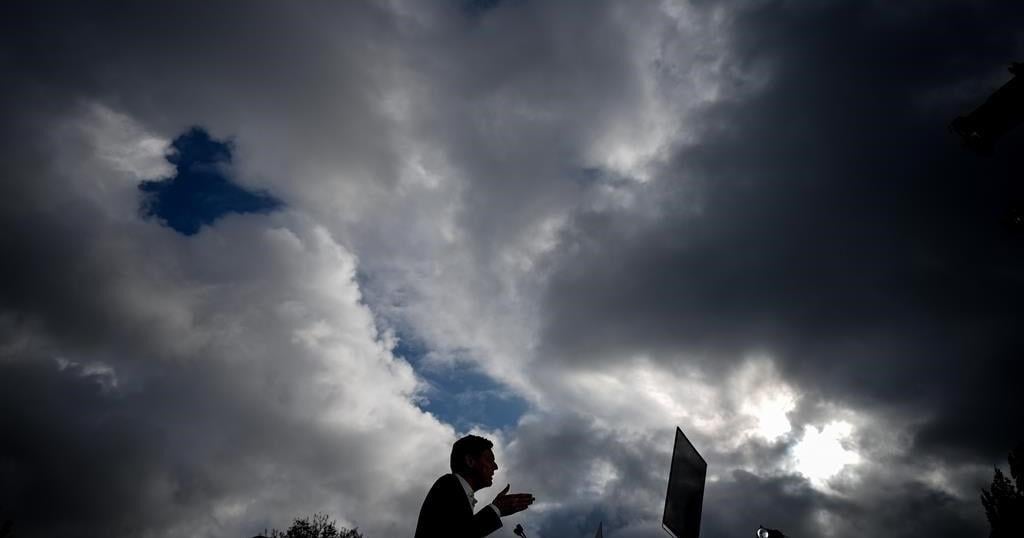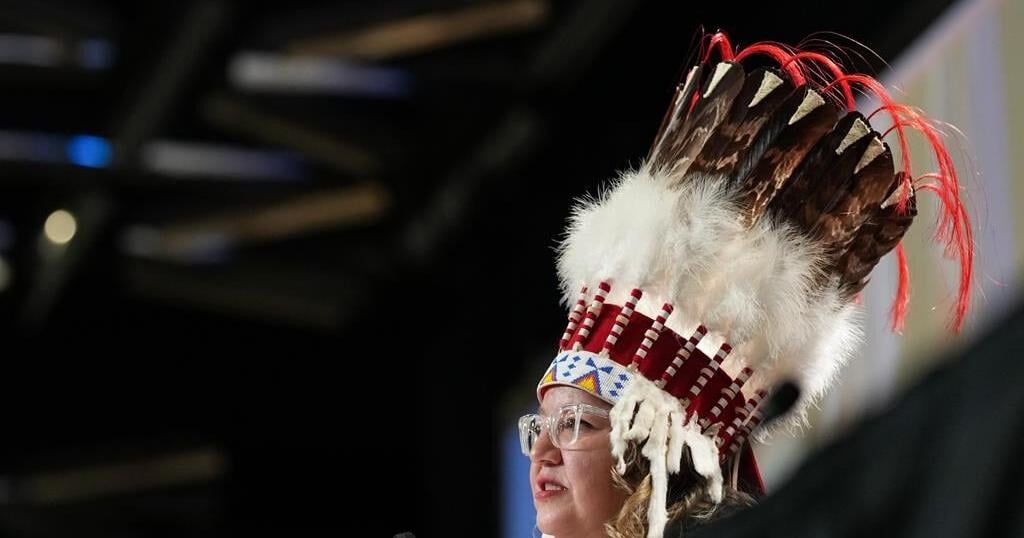Vice presidential nominee Tim Walz and former President Bill Clinton will headline the Democratic National Convention on Wednesday, the third day of the party’s choreographed rollout of a new candidate, Kamala Harris, and her pitch to voters.
Speaker Emerita Nancy Pelosi and Transportation Secretary Pete Buttigieg are also expected to address the convention.
Follow the AP’s Election 2024 coverage at: https://apnews.com/hub/election-2024.
Here’s the Latest:
At Trump’s rally in North Carolina
Lisa Watts, a retired business owner from Hickory, North Carolina, who was attending her fifth Trump rally Wednesday, said she’s feeling “very positive” about the election right now when she thinks about Trump.
“It concerns me of how Harris has been like, a month ago they never spoke her name and now she’s like, quote quote the ‘savior for the country,’” Watts said.
“I don’t think that her record proves that she is ready to run this country,” she added.
Watts said she doesn’t think Trump’s chances of winning are much different now from when Biden was the Democratic nominee because she thinks Harris’ record can’t compare to Trump’s.
“I think the Democrats are going to try to do everything they can to keep her up on that pedestal,” she said, but Watts added she thinks hype around Harris will fade if she speaks off teleprompter.
Tim Walz is still introducing himself to voters
Kamala Harris’ running mate, Minnesota Gov. Tim Walz, will face a national audience that’s still getting to know him when he headlines the Democratic National Convention in Chicago on Wednesday night.
Walz wasn’t widely known outside of Minnesota before Harris chose him to join her on the Democratic presidential ticket. But they clicked when Harris interviewed him, and she was impressed by his record as a governor and congressman — and the splash he made on TV. His attack line against former President Donald Trump and his running mate, Ohio Sen. JD Vance — “These guys are just weird” — spread like a prairie fire.
Since Harris announced her pick, the campaign has raced to introduce the country to the 60-year-old governor and self-described “Midwest dad.” At the same time, Republicans have tried to deflate Walz by poking holes in his biography and some of his past uses of imprecise language and misstatements of facts by him or staffers are resurfacing.
▶ Read more about Gov. Tim Walz
Trump campaign: DNC orchestrated to create appearance of ‘nonincumbency’ for Harris
Trump campaign spokesperson Brian Hughes says the DNC has been orchestrated to “make the appearance of distance and nonincumbency,” even though Harris has “been in the meetings side by side with Joe Biden.”
Hughes said during a media briefing in Chicago on Wednesday that the Democrats put “Biden out to pasture” with his convention speaking slot late Monday night, then “plugged in” former President Barack Obama and former first lady Michelle Obama on a Tuesday evening session of “dynamic speakers.”
“They are trying to put the distance between Harris and Biden,” he said, of the slotting of Biden on the DNC’s opening night, with space between his speech and Walz on Wednesday night, then Harris to close out proceedings on Thursday.
“I think the Obamas did exactly what they were advertised to do: build the fence between Biden and Harris and continue to gaslight America about the notion that Harris has nothing to do with any of this,” Hughes said.
Shapiro brushed aside comparisons between his speaking style and Barack Obama’s
“I never really heard that or thought that until, I guess, the last few weeks,” Shapiro told reporters at an event Wednesday organized by Bloomberg.
During the vice presidential search process, the similarities in their speaking styles prompted social media chatter that Shapiro sounded like the “Jewish Obama.” It even drew an attack from GOP vice presidential nominee Sen. JD Vance, who said earlier this month that it sounded like a “bad impression” of the former president.
Shapiro, who is set to speak to the Democratic National Convention on Wednesday during prime time, said he was flattered by the comparison but “it is not something that I think about when I speak. I really try to speak from the heart.”
Shapiro says he’s at peace with outcome of the running mate search
Shapiro says he’s at peace with how Vice President Kamala Harris’s search for a running mate turned out, suggesting he didn’t believe he’d be the best person for the role as envisioned by Harris.
“This was a deeply personal decision for the vice president, and we had a really good conversation and she laid out her vision,” said Shapiro, the top finalist alongside the eventual selection, Minnesota Gov. Tim Walz. “And in the end, it was a deeply personal decision for me as well.”
He continued: “Based on what she wants, Tim Walz is an outstanding pick,” adding that by remaining as Pennsylvania’s governor, “I get to chart my own course.”
Speaking at an event organized by Bloomberg, Shapiro wouldn’t say If he formally declined the role.
Shapiro on Trump’s attacks against Harris
Shapiro says he expects former President Donald Trump “to figure out how to land a political punch” on Democratic nominee Vice President Harris,” but believes she knows how to withstand his attacks.
Speaking to reporters at an event hosted by Bloomberg, he said Trump’s flailing efforts to attack Harris would eventually firm up as voting nears.
“What you’ve seen with her is an ability to absorb the criticism and just keep going,” he said. “That is a really, really important political trait.”
Pennsylvania Gov. Josh Shapiro says there’s optimism and positivity about Harris ticket
Pennsylvania Gov. Josh Shapiro says Kamala Harris’ elevation to the top of the Democratic ticket is building the party’s coalition back together, positioning her to carry his battleground state.
“There is a genuine interest and curiosity in her candidacy and that’s a good sign,” he said.
Shapiro says that since President Joe Biden dropped out of the race, “there is an optimism and a positivity about the Harris ticket, as opposed to just a negativity about Donald Trump.”
He said voters are “proud to let people know who they’re for and why they’re for that person.”
Still, he told reporters at an event organized by a Bloomberg that Harris will have to run through the tape in his state to win.
Republican congressman: Walz needs to ‘come clean’ on questions about his military service
During a news conference in Chicago, part of the Trump campaign’s DNC counterprogramming, GOP Rep. Mike Waltz of Florida — a former Green Beret — said it’s time for Gov. Tim Walz to “come clean” on some of the questions that have emerged about his military record.
Waltz said Wednesday that he has signed onto a letter with 50 other veterans who’ve served in the U.S. House “denouncing” Walz’s service.
“He says he’s proud of his service,” Waltz said of the Democratic VP nominee, who served 24 years in the Army National Guard. “Why do you have to lie about it? Why do you have to exaggerate it?”
Harris’ campaign has referred to Walz as a “retired Command Sergeant Major,” one of the top ranks for an enlisted soldier. He did in fact achieve that rank, but personnel files show he was reduced in rank months after retiring. That left him as a master sergeant for benefits purposes. The campaign has since adjusted the way it references Walz’s rank.
Walz retired in 2005 as he ramped up for a congressional bid. In March of that year, his campaign issued a statement saying he still planned to run despite a possible mobilization of Minnesota National Guard soldiers to Iraq. According to the Guard, Walz retired from service that May. In August 2005, the Department of the Army issued a mobilization order for Walz’s unit. The unit mobilized in October of that year before it deployed to Iraq in March 2006.
There’s no evidence that Walz timed his departure with the intent of avoiding deployment. But the fact remains that he left ahead of his unit’s departure.
A look at who’s scheduled to speak at the DNC on Wednesday
Democrats have talked a big game about the depth of their bench of rising leaders — and in Wednesday’s DNC program, they’re coming with receipts.
In addition to headlining speeches from former President Bill Clinton and vice-presidential nominee Tim Walz, the convention’s third night will include some of the party’s biggest names and anticipated future leaders.
Former House Speaker Nancy Pelosi of California and House Minority Leader Hakeem Jeffries of New York will speak. So will an all-star list of senators: Cory Booker of New Jersey, Catherine Cortez Masto of Nevada, Amy Klobuchar of Minnesota and Chris Murphy of Connecticut.
Also addressing the convention will be Maryland Gov. Wes Moore and Pennsylvania Gov. Josh Shapiro, who was a finalist to be Harris’ running mate. Both are seen as ascendant in Democratic politics.
To help articulate the evening’s theme around fighting for freedoms, Mini Timmaraju, president and CEO of the nonprofit Reproductive Freedom for All will give remarks.
And Olivia Troye, who worked in the Trump administration as an aide to then-Vice President Mike Pence, will speak about why she’s supporting Harris.
Trump will hold his first outdoor rally since July assassination attempt
Former President Donald Trump’s event Wednesday in Asheboro, North Carolina, has enhanced security from past outdoor rallies, including panes of bulletproof glass boxing in the podium where the Republican presidential nominee will speak.
How Walz and Vance compare in polling
Polling data shows Minnesota Gov. Tim Walz had a smoother launch as Kamala Harris’ running mate than Sen. JD Vance did for Donald Trump.
About one-third of U.S. adults (36%) have a favorable view of Walz, while about one-quarter (27%) have a positive opinion of Vance, according to a new poll from The Associated Press-NORC Center for Public Affairs Research. Significantly more adults also have an unfavorable view of Vance than Walz, 44% to 25%.
Both are well-liked so far within their own parties. Independents are slightly more likely to have a positive view of Walz than Vance, but most don’t know enough about either one yet. About 4 in 10 Americans don’t know enough about Walz to have an opinion about him, the poll found.
Blocks from DNC, man wanted for murder apprehended after standoff at restaurant
A man who escaped from a Mississippi courthouse and is wanted on murder and armed robbery charges was taken into custody Wednesday following a standoff with police at a restaurant in Chicago, blocks from the Democratic National Convention, authorities said.
Joshua Zimmerman was taken into custody Wednesday morning, said Abigail Meyer, a spokesperson with the U.S. Marshals Service.
Zimmerman had been sought by the U.S. Marshals Service since his escape in June and was located Tuesday at the restaurant in Chicago, according to Justin Smith, chief deputy with the DeSoto County Sheriff’s Office in Mississippi.
The U.S. Marshals Service said Zimmerman escaped from the circuit court building in Hernando, Mississippi, where he was being held on attempted murder and armed robbery charges. He was also awaiting extradition to Houston where he’s been charged with murder, the Marshals Service said.
There was no indication of any connection to the Democratic National Convention.
▶ Read more about the Chicago standoff
Cornel West cleared to appear on ballot in Maine, where ranked voting is in play
Independent presidential candidate Cornel West can appear on the ballot in Maine, the state’s secretary of state has ruled.
Shenna Bellows’ decision came Tuesday, about a week after the withdrawal of a challenge to another long-shot candidate, Robert F. Kennedy Jr. The presence of multiple third-party candidates on the Maine ballot is potentially significant because the state uses ranked choice voting to determine a winner.
Bellows ruled that some signatures in support of West were gathered fraudulently but that there was a significant number of valid signatures for the candidate to appear on the ballot. She said in a statement that “the bad actions of one should not impugn the valid First Amendment rights of the many.”
In ranked choice voting, voters rank their choice of candidate by ordered preference, with those rankings used to determine a winner in the event no candidate wins a majority of ballots on which they appear as voters’ first preference.
Fannie Lou Hamer rattled Democratic convention with her speech 60 years ago
Vice President Kamala Harris is accepting the Democrats’ presidential nomination Thursday, exactly 60 years after another Black woman mesmerized the nation with a televised speech that challenged the seating of Mississippi’s all-white delegation to the 1964 Democratic National Convention.
The testimony of Fannie Lou Hamer to the credentials committee in Atlantic City, New Jersey, was vivid and blunt.
She described how she was fired from her plantation job in retaliation for trying to register to vote and brutalized in jail for encouraging other Black people to assert their rights. She told of arbitrary tests white authorities imposed to prevent Black people from voting and other unconstitutional methods that kept white elites in power across the segregated South.
Whether every eligible citizen can vote and have their vote be counted is still an open question in this election, said U.S. Rep. Bennie Thompson, who’s speaking Wednesday at the Democratic National Convention in Chicago. He got his first practical experience in democracy at Hamer’s urging in 1966, when he was a college student in Mississippi and she recruited him to register other Black voters.
Hamer has already been the subject of appreciation this week, as the Democrats’ convention began Monday.
▶ Read more about Fannie Lou Hamer
The ex-presidents club
If the Republican convention was all about Trump, the Democrats on Tuesday wanted to put Harris in a pantheon with past presidents. It wasn’t just Obama who made the case for the vice president. The convention turned to the grandsons of Jimmy Carter and John F. Kennedy to also portray her as the natural heir of past Democratic leaders.
As groundbreaking as Harris’ candidacy is as the first woman of color to be her party’s nominee, these speeches by an ex-president and presidential progeny were all about linking her to a broader historical arc, creating a nostalgic message that can animate an increasingly older electorate.
“Kamala Harris carries my grandfather’s legacy,” said Jason Carter, the grandson of the 39th president. “She knows what is right and she fights for it.”
Jack Schlossberg suggested Harris would carry forward the agenda of Kennedy.
“She believes in America like my grandfather did,” Schlossberg said. “That we do things not because they’re easy, but because they’re hard.”
A message for Republicans: It’s OK to Quit Trump
The Democrats are making a play for disaffected Trump voters — and they used one of his former White House staffers to make their case Tuesday night.
Stephanie Grisham worked in various roles in the Trump White House, including communications director and press secretary, allowing Democrats to argue that those who know Trump best have seen him at his worst.
“He has no empathy, no morals, and no fidelity to the truth,” Grisham said. “I couldn’t be part of the insanity any longer.”
Kyle Sweetser, a Trump voter from Alabama, told the convention the former president’s tariffs made life harder for construction workers like him.
























